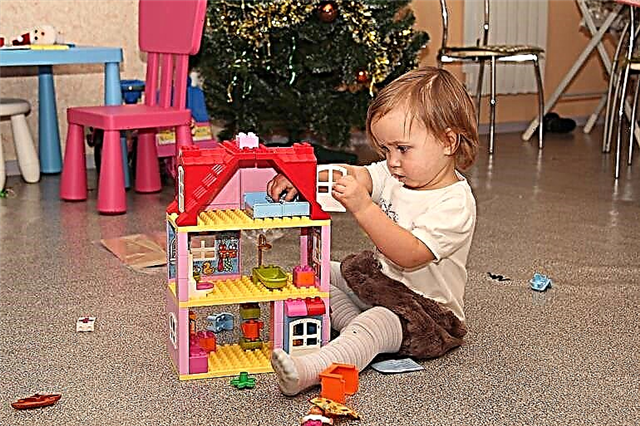As soon as a woman becomes a mother, the baby becomes the center of her attention: she immediately wants to provide him with proper care, to deal with the peculiarities of the child's body. Future feedings will depend on how quickly and how much milk came, whether high-quality lactation has improved: breastfeeding or artificial feeding, maybe mixed. Sometimes the baby constantly hangs on the chest or demands a mixture screaming, so questions about how to understand that a child overeats, and whether it is possible to overfeed him, is relevant for mothers of babies.

Breastfeeding a baby
How to identify a child's overeating
There are three times when a baby may seem to be overeating:
- He begins to regurgitate profusely after feeding;
- Often applied to the chest;
- Begins to gain weight at a rapid pace.
In order to determine exactly whether the cause of the excitement is true, and whether it is worth understanding it more deeply, you should find out why, from a physiological point of view, the above situations occur.
Most often, young mothers are worried that they can overfeed their child, because the baby constantly spits up after the next feeding. Attempts to introduce a specific nutritional schedule by the hour or to replace the brand of the formula do not give any result.
A feature of the infant's digestive system is the fact that his stomach is horizontal for up to a year, the sphincter is rather weak, the esophagus is thin and undeveloped. In view of this, no matter how much the baby eats, he can vomit. If he, in addition to everything, "swallowed" the air, or he was immediately put on the bed, then he will surely vomit. It is worth worrying only when the crumbs vomit like a "fountain". Then it is imperative to see a doctor.
Important! For some mothers, this information is not enough, they continue to find out the answers to exciting questions, what to understand, whether to worry. In this case, there is a formula for determining how much milk your baby needs per feeding.
Overeating and breastfeeding
Whether a child can overeat on gv is a question that worries many. Even in the last century, children were fed by the hour, believing that this way the baby would not overeat, and a certain regime would also be developed.
However, today breastfeeding is increasingly positioned at the request of the baby, there is evidence that by nature it is more appropriate and correct.
Note! The baby will not be able to overeat while breastfeeding. Considering the human anatomy and physiology, it can be noted: the regulatory system tells when there is a need for food. A signal is sent to the brain to the satiety center that the amount of food is sufficient, and the baby stops sucking. No matter what mom does, he will not eat anymore, therefore, you can not worry about any overfeeding. Until a new signal arrives at the center of hunger, the crumb will not demand food.
The amount of milk per feeding
For especially curious mothers, pediatricians suggest using a certain formula for calculating milk per feeding. To do this, the full month of the baby's life is multiplied by 30, then another 30 ml is added.
One feeding (in ml) = 30 ml + 30 * age (in months).
Important! The stomach of a newborn is at first so small that it cannot physically eat much. Therefore, in the first days after childbirth, he is content with a small amount of colostrum, which is enough for him. No supplementation should be applied.

Newborn stomach volume and size
Features of breastfeeding and artificial feeding
If the question is whether an infant can overeat while breastfeeding, the answer is unequivocal, then there are disagreements among pediatricians with babies on artificial formula.
Mother's milk is ideally balanced for the baby and is suitable for his stomach, strengthens the immune system, protecting it from infections. Therefore, even after the introduction of complementary foods, in the presence of guts, the crumb is completely protected. Also, milk changes its composition as the baby grows, arriving in the amount that he needs during this period. Thus, a clear, well-coordinated mechanism works for the guards.
The mixture for the body of the crumbs is an artificially derived formula, so he does not know how much he needs to eat. In view of this, the mother needs to measure the required amount so as not to overfeed the child. Unfortunately, the mixtures are not ideally balanced, unlike milk, and the baby can overeat and gain excess weight quite quickly. Sucking from a bottle is another disadvantage (the child cannot regulate the incoming flow himself). At this flow rate, the brain does not receive a signal of fullness at the right time, and the baby overeats.
Infant growth chart
What kind of weight gain in infants in the first month of life, and how many kilograms they can gain, are individual questions, depending on weight, height at birth. Usually the figure ranges from 500 grams. up to 2 kg.
Indicators largely depend on hereditary factors, type of feeding, activity and temperament of the baby. If it seems that the baby is not getting enough, then after consulting the pediatrician, some changes should be introduced.
Up to 6 months, the baby monthly gains up to 1 kg in weight, after six months - 300-600 grams. Growth up to 6 months every month is added by 2-3 cm, then by 1-1.5.
Note! The development of the baby is "leapfrogging": in one month, weight can be added a lot, but the growth remains in place. In the next month, on the contrary, the crumb may become taller.

Child's weight change graph from birth to five years
Weight control accessories
To control weight, some mums try to weigh their baby before and after feedings. This should not be done, since fatigue will accumulate, and the baby will be nervous again.

Children's electronic scales, Italy
The most effective accessory is considered electronic scales for babies, which can be purchased in specialized stores. Before making such a purchase, you need to think about whether you need it. As a rule, the examination of the pediatrician in the first year is carried out often, so it will not be difficult to measure the weight and height during such a visit.
High weight gain while breastfeeding
If the baby is gaining a lot of weight while breastfeeding, then this is not overfeeding.
Factors:
- Genetic predisposition - all family members are large in the family;
- Low activity of the baby;
- Features of temperament and character;
- Pathologies and diseases.
How often to apply to the chest
Today, pediatricians advocate breastfeeding on demand, arguing that this will prevent the baby from overeating. Most women of the Soviet era are against this, they argue that then obesity cannot be avoided.
Often in the first month, the baby almost always "hangs on the chest", which is considered a normal, natural phenomenon. This happens due to the fact that lactation is just being established, the baby is learning to suck. He also won't be able to overeat because of his small stomach, so such experiences are absolutely groundless.
Important! The baby needs not only milk, but also warmth, comfort in his mother's arms. It so happens that he may not suck milk, but just quietly snore. Hunger is not always the cause of a child's whims.
After 1-2 months, the baby usually sets the feeding schedule himself, the breaks are about 2.5-3 hours. It is important to give one breast at a time so that the baby receives both "front" and "back" milk. In this case, the baby will be full and will not constantly ask for food.
Causes and consequences of frequent feedings
A newborn baby never overeats while breastfeeding.
"Lactation" crises, the appearance of the first teeth - stress for the baby, so he spends more time on his chest. These periods pass quickly, you should not strive to introduce a supplement mixture - this way lactation may not persist.
If frequent feedings in the first month are normal, they will not bring any consequences, except for the calmness of the baby. If the baby has already reached the age of six months, then in such cases the cause of their appearance should be excluded.
Important! Excess weight appears only when feeding with an artificial mixture and non-compliance with the norms indicated on the package.

Overweight in a child
Additional Information. Frequent feedings are biologically correct. Do not believe the myths that frequent breastfeeding leads to engorgement of the mammary glands. The opposite effect has been scientifically proven.
The main reasons for overeating
Symptoms of overeating in infants may include the following:
- The presence of nausea and vomiting;
- Tummy pain;
- General health worsens;
- Disruption of bowel function, diarrhea.
The first signs of overeating in a baby are his lethargy, weakness. The baby begins to refuse feedings, turns away and cries a lot.
Important! The reasons for overeating can be not only habitual overfeeding with a mixture, but also violations in the diet. If a lot of time passes between meals, then the baby at the next feeding will try to eat for the future. Sometimes the cause of overeating can be a psychosomatic factor, which should be addressed with a psychologist.
It is necessary to breastfeed the baby, if possible. Expressed milk from a bottle can cause overfeeding because the dose is incorrect.
Mom's overlactation (large milk supply) is also a cause of overeating. However, such cases are possible only in the first months after the birth of the baby, when the mother's body adjusts to the needs of the child.
How much does a newborn eat
How can you understand that a baby is overeating - refer to generally accepted norms:
- In the first 3-4 days, he eats 20-60 ml per feeding;
- In the first month - up to 110 ml;
- Six months - up to 250 ml;
- Per year (in the presence of gv) - no more than 250 ml, since complementary foods have already been introduced.
What to do if you overeat
If, nevertheless, the newborn overeats what to do:
- 2-3 feedings in a row from one breast, after - replace with another;
- Those breasts that are not involved in feedings are expressed to relieve the condition;
- The amount of milk to be expressed should begin to decrease, therefore, its supply will decrease;
- Drink mint tea, fruit drinks and fruit drinks;
- The frequency of feeding is 6-10 per day.
If the crumb has eaten more than it should be, do not worry - it will spit up the excess. Restricting the baby in food, changing the diet is not the best idea. It should be remembered that the baby grows, learns the world and discovers new abilities in himself, therefore, the previously plump toddler will soon become a fit and nimble baby.



